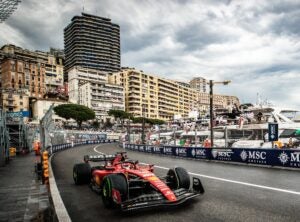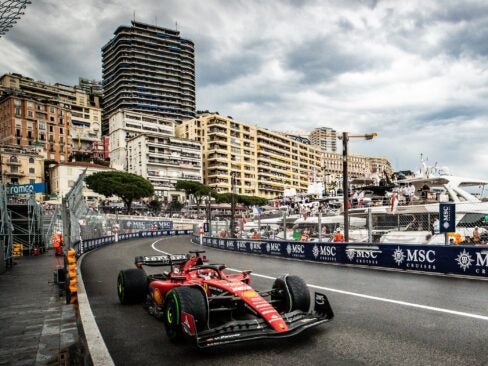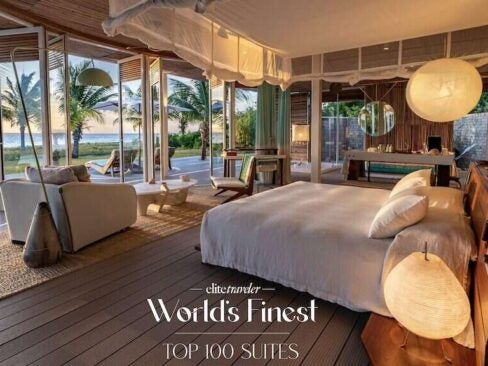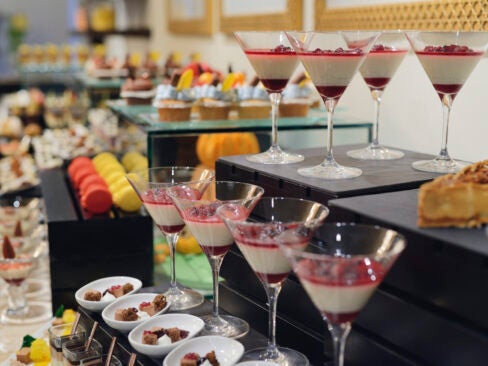
The President’s page
When I was growing up in the seventies the route from Europe to Asia meant middle of the night stops in Baghdad, Tehran or Karachi.
Then in the nineties Dubai’s leadership realized that tourism creates one in nine jobs worldwide, so why not become a destination and a regional business hub? That strategy worked amazingly well. The opening decade of the new millennium saw the Burj Al Arab, multiple man-made islands in the shape of palm trees, a shopping center with an indoor ski slope, massive resort and real estate developments, championship golf courses, championship horse racing grounds, the world’s tallest building and various business zones designed to attract multinational regional headquarters, global media and Internet companies. Celebrities from sports and Hollywood regularly touched down for premieres, galas and openings. It was Las Vegas without the gambling and Disneyland without the mouse.
It was Las Vegas without the gambling and Disneyland without the mouse.
That was last decade. While Dubai remains busy and booming (expecting to break ten million visitors this year), going west on the southern shore of the Persian Gulf, you’ll find new somewhat unlikely destinations that are reaching onto the global stage (see our Sep/Oct issue for the Top Suites of Abu Dhabi).
THE GOAL AHEAD
About a 50-minute flight due west, Qatar is an absolute monarchy ruled by the Al Thani family since the mid-19th century and today the Emir, His Highness Sheikh Hamad bin Khalifa Al Thani, is taking the former British protectorate (it has been independent since 1971) known for pearling to higher altitudes, starting with a glistening skyline of variously shaped towers and Vision 2030, a 35-page manifesto that describes a national plan “transforming Qatar into an advanced country by 2030, capable of sustaining its own development and providing for a high standard of living for all of its people for generations to come.
” Holding the world’s largest proven reserves of natural gas and a citizen population of less than 300,000, Qatar, despite its own wealth, has attracted an estimated $100 billion in foreign investment, with at least half from the US energy sector. While popping into world discussions as television talking heads couldn’t figure out whether to say “Cutter” or “Kataar,” it still remained largely out of the mainstream travel conversation.
Of course that all changed in Zurich on December 2, 2010 when Sepp Blatter read out the words, “The winner to organize the 2022 FIFA World Cup is Qatar.” The last World Cup was watched by 3.2 billion people, 46 percent of the world’s population, meaning the real world will be hearing about Qatar more and more and more.
While football matches may still be a decade away, Qatar has been on the move for some time, at home and abroad. Who owns Harrods? An investment arm of Qatar’s royal family. And fashion designer Valentino? See above answer. The famed Raffles Hotel in Singapore? You get the picture. And don’t forget minority stakes in LVMH and Tiffany’s. As Dubai was building nightclubs and fairways, Doha was building universities and cultural zones.
WELL CONNECTED

A key driver in the rise of Qatar’s global profile has been its airline boss, Akbar Al Baker, the 53-yearold former civil servant who in 1997 inherited an airline with four planes and a few regional routes.
I first met Qatar Airways’ CEO in 2001 greeting visitors to his stand at the world’s largest travel fair, ITB in Berlin, an annual gathering of over 100,000 exhibitors and visitors, including general consumers. Most of the world’s largest airlines don’t even exhibit at the fair, let alone subject their CEO to possibly unhappy travel agents and consumers with unresolved complaints about lost luggage and bad service.
On my most recent visit to Doha, Al Baker was celebrating bringing together a quartet of famous chefs—Nobu Matsuhisa, Tom Aikens, Ramzi Choueiri and Vineet Bhatia—to design meals for Qatar Airways’ premium passengers. With his fleet and destinations now over 100 each, one of the industry’s largest order books of long-haul aircraft and projections to grow to over 170 planes and destinations in the next 36 months, the airline has made a name for itself by connecting passengers via its Doha hub on a route network that spans the Americas, Europe, Africa, Asia Pacific and the Middle East. Its private jet business, Qatar Executive, has a letter of intent for ten Global Express jets and plans to expand even further.
With a population of 1.95 million, Qatar is ranked 147 in the world, between Slovenia and Lesotho and behind Macedonia, Latvia, Armenia and Albania, making the fact that its flag airline carries over ten million passengers a year even more amazing.
The demanding CEO has shelves of awards, fruits of his obsessive demand for quality service, including Skytrax’s Best Airline of the World the past two years and Best Middle East Airline the past seven. Even business-class passengers at New York JFK are greeted curbside by porters. Seating on its 777s is two-by-two-by-two with 78- inch pitch—equivalent to what most airlines offer in first class. The seats go horizontal and flat, and the well-presented meal service is definitely firstclass caliber. A brand new airport opens in 2013. At any rate, Al Baker has done a big favor for local hoteliers as those elite travelers making Doha their destination likely arrive in a good mood.
HIGH-END AND HIGHBROW
Back to Qatar: Catching up with Al Baker after the press conference, he told me, “We started very late [on tourism], but we are coming on strong.We have a new energetic tourism CEO.
We are putting Qatar on the map.We don’t want to be a backpacker destination where people come to just go to nightclubs. We want quality tourism, and therefore are focused on culture, diving, conferences, exhibitions and education based on our many universities here.”
So while in Dubai a newspaper headline might herald Paris Hilton coming to town to shoot a new reality show, theQatar Tribune Nation is more likely to tout the opening of an exhibit by Turkish artist Irfan Önürmen, a visit by the dean of Carnegie Mellon as part of that university’s expansion here or Wynton Marsalis’s arrival for the debut of Jazz at Lincoln Center, a club at the new St. Regis on theWest Bay.
Education and the arts are serious business here: Set seven miles inland, 2,500-acre Education City (about three times the size of New York’s Central Park) includes campuses from VCU, Cornell Medical, Texas A&M, Carnegie Mellon, Georgetown and Northwestern, while the arts scene is gaining world attention. The New York Times referred to the 2008 opening of the I.M. Pei-designed Museum of Islamic Art as “the centerpiece of an enormous effort to transform Qatar into an arts destination.” On the West Bay, Katara Cultural Village features an opera house, theater, amphitheater and exhibition galleries. Programs run the gamut from Aida this past October to Romeo and Juliet in Baghdad, created by the Iraqi Theatre Company, and a violin recital by Esther Yoo, the youngest laureate of the 10th International Jean Sibelius Violin Competition.
As part of its pitch for high-end tourism, the Qatar National Convention Centre (QNCC) opened by hosting theWorld Petroleum Congress in 2011, the first time it was held in an Arab country. The center features a 4,000-seat theater, 400,000 square feet of exhibition space (about the same size as ExCeL in London) and seating for a 10,000-person banquet. In acknowledgement of Vision 2030’s focus on sustainability, the United Nations selected QNCC to host dozens ofworld leaders, hundreds of media and thousands of delegates at its 18th Annual UN Climate Change Conference this month.
Qatar’s rise is not competition to Dubai but complementary, according to Ashraf A.R. Abu Issa, chairman of Abuissa Holdings, a Doha-based business conglomerate spanning the region with offerings from luxury retail, including Godiva and Zilli stores, to telecommunications. Abu Issa put it this way during an interview at his Blue Salon department store: “Dubai wants capital and tourism from the outside. Qatar has wealth and natural resources so it is not so important to attract mass tourism, and we don’t need outside money. We want guests on the high end, specifically culture, education, meetings and sports. The region can’t take two Dubais.”
STRONG STATISTICS
Qatar is a young country. According to The World Factbook, the median age is 32.
The Emir’s focus on education has resulted in a 96.3 percent literacy rate, and the country’s riches speak to its 1.6 percent unemployment rate, second lowest of the 130 countries measured.
There is also no denying growth is on the way. Qatar has the world’s number one population growth rate per capita and is first in net migration rate. And in an area of the world where the role of women can be hard to understand and easily misunderstood, Vision 2030 specifically addresses the subject, calling to “enhance women’s capacities and empower them to participate fully in the political and economic spheres, especially in decision-making roles.”
BRINGING GLOBAL BRANDS IN
Safak Guvenc is general manager of the Jaidah Holdings-owned W Hotel and has been in Doha for over five years.
Guvenc believes the success of the lifestyle hotel here underscores both locals’ thirst for the good life and the emergence of Doha as a key regional and global hub. “With (Jean-Georges Vongerichten’s) Spice Market we were the first hotel to bring a branded restaurant here,” Guvenc noted during a chat in the hotel’s busy lobby. Fellow Starwood hotel The St. Regis, which opened this past spring, has two Gordon Ramsay outlets and a Hakkasan, while Four Seasons will open a dramatic David Rockwell-designed Nobu next year at the edge of its 112-berth marina.
Alfardan Group, owner of The St. Regis, is a good example of Qatar’s growth curve. It also owns the Kempinski Residences and Suites. Its auto business includes selling Rover, Jaguar,BMW, Maserati and Rolls-Royce. At Alfardan Jewellery you can buy watches from Harry Winston, Chopard, Vacheron Constantin, Franck Muller, Corum, de Grisogono, Breguet, Jacquet Droz, Zenith, Glashütte, Romain Jerome and Roger Dubuis, plus Italian designer jewelry from Maria Gaspari, Stefan Hafner and Pasquale Bruni. Alfardan Marine Services has started chartering boats for leisure and transportation and placing its services under the control of various marine-related companies.
Omar Alfardan, president of the group, told Elite Traveler, “Qatar has achieved to put itself on the world map as the ideal choice for investors and visitors alike as it is considered in the international community as one of the best investment destinations in the region given the excellent infrastructure, political stability, security, strong government support and investment-friendly policies offered by the country. With new initiatives introduced by the government and Qatar’s strong GDP, smart investment concepts would always be welcomed.”
LOOKING ABROAD
Underscoring Qatar’s growing global reach, Abuissa Holdings will open a New York branch of its popular Gulf luxury luggage/lifestyle retailer Mosafer in 2013 with plans to have up to 100 stores.
Katara Hospitality, the answer to who owns Raffles Singapore, will have 30 operating assets by 2016 with plans to add 30 more by 2026, and plans to start its own global luxury hotel brand under which it will manage hotels for non-Qatari owners. Previously know as Qatar National Hotels, the company also owns Raffles Hotels’ Le Royal Monceau in Paris and The Peninsula Paris hotel due to open in 2014. It’s also currently renovating the Gallia hotel in Milan, expected to reopen in 2014 under a yetto- be-chosen flag. In Lucerne, The Bürgenstock Resort will reopen in 2014 as will Lausanne’s Hotel Royal Savoy. Katara has proven an able operator: Hotel Schweizerhof-Bern reopened in 2011 after six years of closure and immediately had its best ranking ever—11th place in Swiss business magazine Bilanz’s ranking of the country’s best hotels. Other projects include a luxury resort in the Comoros and a former palace in Tangiers, both slated for 2015, and a third Paris project.
BACK AT HOME
In Qatar, Katara is a major player with The Ritz- Carlton, Sharq Village managed by Ritz-Carlton, a Marriott and Sheraton among others. Its flagship will be part of the upcoming Lusail development, a pair of luxury towers with a design inspired by the seal of Qatar. During a coffee at the Sheraton, Katara Hospitality Group Director of Marketing Tamara Khalil described the new project as “the Burj Al Arab of Qatar.”
Lusail City of course is no small project. Set on Doha’s western edge, it is a division of Qatari Diar Real Estate Investment Company whose 49 projects span 29 countries with a combined value of $35 billion, including City Center in Washington, DC, Shell Centre in London and superyacht marina Port Tarraco on Spain’s Costa Dorada. Lusail is a city with a series of distinct districts and will eventually be the home of about 250,000 residents as well as the stadium that will host theWorld Cup Final, plus a myriad of shopping malls, marinas and parks. All totaled, the development may exceed $20 billion, and the list of available tenders goes on for over 100 web pages.
And lest one forget about the country’s first signature development, The Pearl, some six hotels are planned to open in the next several years, including a second Four Seasons, complementing a mega-yacht marina that will have slips for over 60 100-foot yachts, nestled amid luxury apartments that will be home to some 41,000 residents and a shopping center that already features the likes of Balenciaga, Chloé, Missoni, Mulberry, Canali, Corneliani and Stefano Ricci.
Qatar’s excellent adventure has a different rhythm than the stereotyped rich country du jour coming around theWestern world and buying stuff up. Katara’s Khalil says the company specifically looks for landmark hotels that have seen better days and are in need of investment. “We want the community to see we are doing something positive, restoring a treasure and creating jobs.”
Vision 2030 reads like something from a John Lennon song, with a directive to “develop a spirit of tolerance, constructive dialogue and openness towards others at the national and international levels.” By design, the beat of Qatar may be more about students tapping on keyboards in university classrooms than dancing on tables in a disco. Either way, with over 40 percent of the current population associated with construction, there will be plenty of opportunities for elite travelers to do business in Doha. And as to the World Cup, for Qatar the event is more likely to be a stop along the way than a destination.








